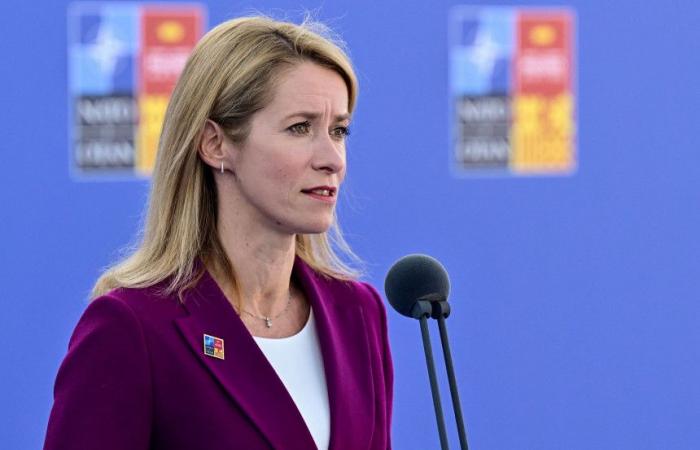Estonian Prime Minister Kaja Kallas is stepping down to form a new three-party coalition.
The Reform Party of Estonia, the “Motherland” party and the Social Democratic Party reached an agreement to form a ruling coalition on Friday after almost a month of negotiations. It has been possible to fundamentally harmonize the opinions of the parties in various policy areas, and in the coming days the leaders of the parties will agree on the distribution of ministerial positions, according to the statement of the three parties, informs lsm.lv.
According to the Estonian media, after the signing of the coalition agreement, Kallas will announce his resignation from the post of prime minister in the parliament, the Estonian president will then nominate him as the new prime minister candidate, after which the parliament will vote to approve the new coalition, reports lsm.lv.
Estonian Prime Minister Kaja Kallas could end the protracted government coalition negotiations if she resigned or if the parliament voted to express no confidence in her, and then the country’s president could invite someone else to form the government or announce early parliamentary elections, the situation in Estonian politics has been described by the country’s president Alar Karis, admitting , that he would not like to come to the announcement of extraordinary elections, LETA agency reported.
As the President of Estonia said in an interview to “Postimees” newspaper, the government coalition needs to be formed soon. “We can already think that nothing happens in the summer and everyone sits on the beach and dips their feet in the water, but political decisions are still needed. Officials still do their job, but at some point what the officials have done requires a political assessment and decisions. It’s not like nothing happens in the summer will not happen, the government should be formed as soon as possible and it would be good if it had the support of the majority in the parliament,” he said.
Karis added that the consequences of not taking certain decisions or taking them late will be felt later. “We will suffer later. Inflation will rise quite a lot, prices will rise, in the fall they will rise in the entire energy sector. We now have to think about a support mechanism to control inflation. We have to start preparing these decisions now,” the Estonian president said.
Karis also reminded that Estonia has had a minority government before and the government coalition partners have changed, so the situation is not new. “However, it is understood that if a new coalition is to be formed, the Prime Minister must decide how to do it. She will resign and ask for a new mandate for her coalition agreement, or simply change ministers. I suggested that this could be resolved through a compromise: if she does not resign, she has to make a policy statement in parliament. MPs could ask questions and then she can indirectly present the plans for those eight or nine months [līdz parlamenta vēlēšanām] and who will be the ministers and what are their plans,” said Karis.
The President of Estonia informed that he had met with the representatives of the political parties and, as he thought, a compromise had already been found on several issues. “There is optimism in those voices. I still believe that the coalition will be formed because there is a will. Now something has started to move forward,” he added.
As the easiest solution, Karis mentioned the resignation of the current Prime Minister Callas. A vote of no confidence in the Prime Minister in Parliament is still possible. After that, the Estonian president can entrust the formation of the government to someone else or call early parliamentary elections.
At the same time, Karis admitted that, taking into account the political landscape in the country, early elections would not be the best solution, as some parties have not yet developed their programs and therefore the elections “would not reflect the current situation and could cause tension later” because all political forces would not be given a fair chance to enter the parliament .
He emphasized once again that the Prime Minister is responsible for the formation of the coalition and the course of negotiations, and in case something does not happen as it should, she must admit it and step down.
It has already been reported that at the beginning of June, the President of Estonia, fulfilling the Prime Minister’s request, dismissed all seven ministers nominated by the Center Party led by the Speaker of Rīga Kogi Jiri Ratas, and soon after announced the proposal to start coalition negotiations with the “Motherland” party and the Social Democratic Party, while the Center Party the board decided to make such an offer to the Conservative People’s Party (EKRE) and “Tēvzeme”.
Since June 13, the Kallas-led Reform Party, Tēvzeme and the Social Democrats have been negotiating to form a coalition.
Until the formation of a new government, all portfolios of ministers nominated by the Center Party are divided among the ministers of the Reform Party in accordance with the existing procedure for replacing government members.
In the Estonian parliament, which has 101 members, the liberal Reform Party has 34 seats, the Center Party – 25 seats, the right-wing populist EKRE – 19 seats, the national conservative party “Motherland” – 12 seats, the Social Democratic Party – 10 seats, and one member is independent.
The regular parliamentary elections in Estonia are expected in March next year.






